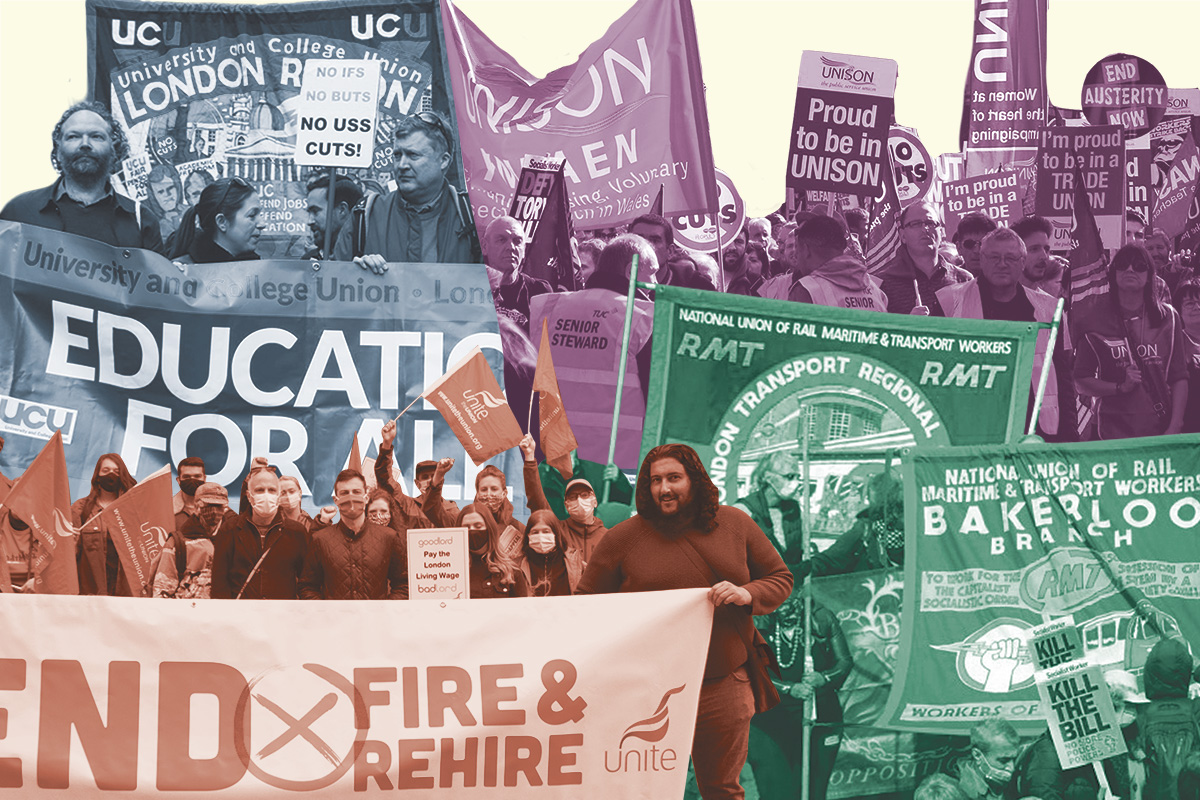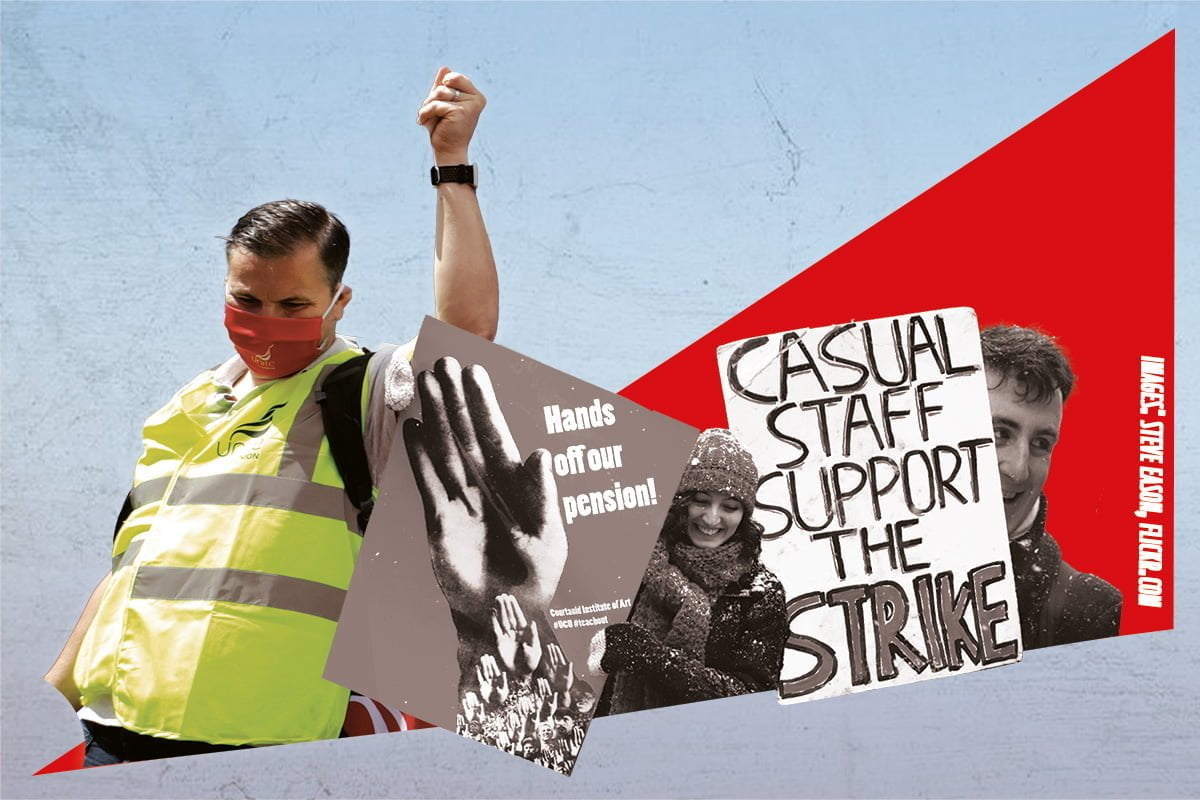As war rages on in Ukraine, the bosses and Tories are waging a class war back home. Blocked on the political front, workers are increasingly turning to the industrial front. Explosive events lie ahead as the crisis of capitalism deepens.
While our TV screens are plastered with wall-to-wall news of Ukraine, a far more ominous crisis is looming at home.
“For the past two years industrial action has largely paused while unions focused their energies on saving jobs threatened by coronavirus lockdowns,” writes the Financial Times.
“But in 2022, with employers battling staff shortages and inflation already at a 30-year-high,” the same article continues, “workers in a range of sectors from transport to custodial work to education, on the front lines and in white collar offices, are downing tools.”
These lines from the bosses’ paper are a dire warning to the establishment of the storms that impend on the industrial front, as workers are squeezed and the cost of living spirals ever upwards.
Strikes

Workers in different sectors are taking or about to take industrial action: from bin workers to university lecturers; from rail workers to teachers.
Tube workers have been striking over pensions. Workers at Airbus and GE Aviation Systems have taken action over pay, as have truck and bus drivers. And cleaners at hospitals, railway stations, and Facebook’s London offices are all on the move too.
The threat of a national rail strike looms, if negotiations over restructuring break down between the operating companies and Network Rail.
“People work way beyond what they are expected to do in their job descriptions,” states Daniel Shannon-Hughes, a branch representative for Unison, which represents security and support staff in education, as well as other workers in the public sector.
“Even before inflation started increasing at a rapid rate our members had seen real-terms pay cuts for over a decade. It gets to the point where you have to say enough is enough – it can’t go on like this. And we’ve reached that point.”
This is the biggest upsurge in strikes we have seen for decades. It reflects a new turn in the situation, as discontent amongst workers reaches its limits.
Inflation

There has been a 40-year lull on the industrial plane, with workers tightening their belts, forced to work longer and under greater stress than ever before.
The trade unions, while expressing verbal opposition, did little to galvanise this mood and translate it into action. Where unions did fight, they were largely isolated or took limited action.
But dialectically, things turn into their opposite. At a certain point quantity turns into quality.
Following the squeeze during the pandemic, the pressures on workers have been compounded by the dramatic rise in the cost of living.
Real wages have been dramatically cut, which is having a massive impact on living standards. Bitterness and anger are rising in the workforce, the likes of which we have not seen before.
With workers taking early retirement, burned out by the intensity of work, and restrictions on foreign labour, labour shortages have opened up in certain areas. This has strengthened workers’ bargaining power. But for most workers, prices are outstripping wages.
Most employers are resisting wage rises in line with inflation, eager to defend their profits. This, at a time when the price of food, transport, energy, and fuel is starting to rocket, and when pensions are being cut.
As one striking rail sector cleaner said: “I have to work 84 hours a week to bring enough money in.”
Fightback

What is clear is that there is a lot more pain down the line for British workers.
“It adds up to a combustible moment in labour relations, and a test for Britain’s unions in the most intense period of worker unrest since the 2016 Trade Union Act placed new, onerous limits on their activities,” warns the Financial Times.
The era of relative industrial quiet is over. Workers are fighting back: not only over wages, but against deteriorating terms and conditions also.
There are demands to limit precarious work, including short-term and zero-hours contracts, which have become endemic in many workplaces. Outsourced workers in St Barts hospitals in east London have won their dispute to be brought in-house – a demand that is spreading.
As living standards are cut to the bone for many workers, they have no alternative but to strike. Either that or be ground down. But many, as the Financial Times admits, have already reached their limit.
Crisis
This explosive situation is unfolding at a time when the biggest unions – Unite and Unison – have moved further to the left. In the case of Unison, with 1.3 million members, it has shifted dramatically from right-wing control to the left.
In the past, unions like Unison acted as a brake on workers’ struggles. Now that has changed. This means the big unions will reflect even more these pressures from below.
The scene is set for an explosive rise in the class struggle, compared to the past. Blocked on the political front, with Starmer’s Labour more often than not in bed with the Tories, the working class is now looking at the industrial front.
Events are moving rapidly, including in Britain. The ‘recovery’ is running into the sand, with growth and investment on a downward path.
The working class is now being asked to pay a massive price for this capitalist crisis, while the rich are getting richer. Massive austerity is on the order of the day, at a time when the working class has had enough.
The war in Ukraine, meanwhile, is pouring fuel on the fire. As sanctions begin to bite, it is workers who are feeling the pain. With oil and gas prices soaring, household energy bills are set to go through the roof – potentially to as high as £3,000 annually, on average, by the end of the year.
As a result, the Resolution Foundation predicts that inflation could climb to well over 8% in the months ahead, leading to the biggest squeeze on incomes since the crisis of the 1970s.
Revolution

It is not the Ukraine war that will be worrying the establishment, however, but class war.
We are going to experience one shock after another. We are entering a stormy period, where consciousness will be rapidly transformed on the basis of events. Capitalism is becoming a nightmare for workers and their families.
This will put the trade unions to the test. It will put left leaders to the test.
Millions of workers, inactive in the past, will be drawn into the struggle. In the process, they will draw radical and even revolutionary conclusions.
Our task, therefore, will be to link the day-to-day demands with the need to transform society along socialist lines.
A new chapter is opening up in Britain. The old mole of revolution has been busy burrowing away. All the contradictions of capitalism are coming together in the most explosive manner.
We are heading for revolutionary storms that will pose the question, in the not too distant future, not of ‘reforming’ capitalism, but of workers’ power.






